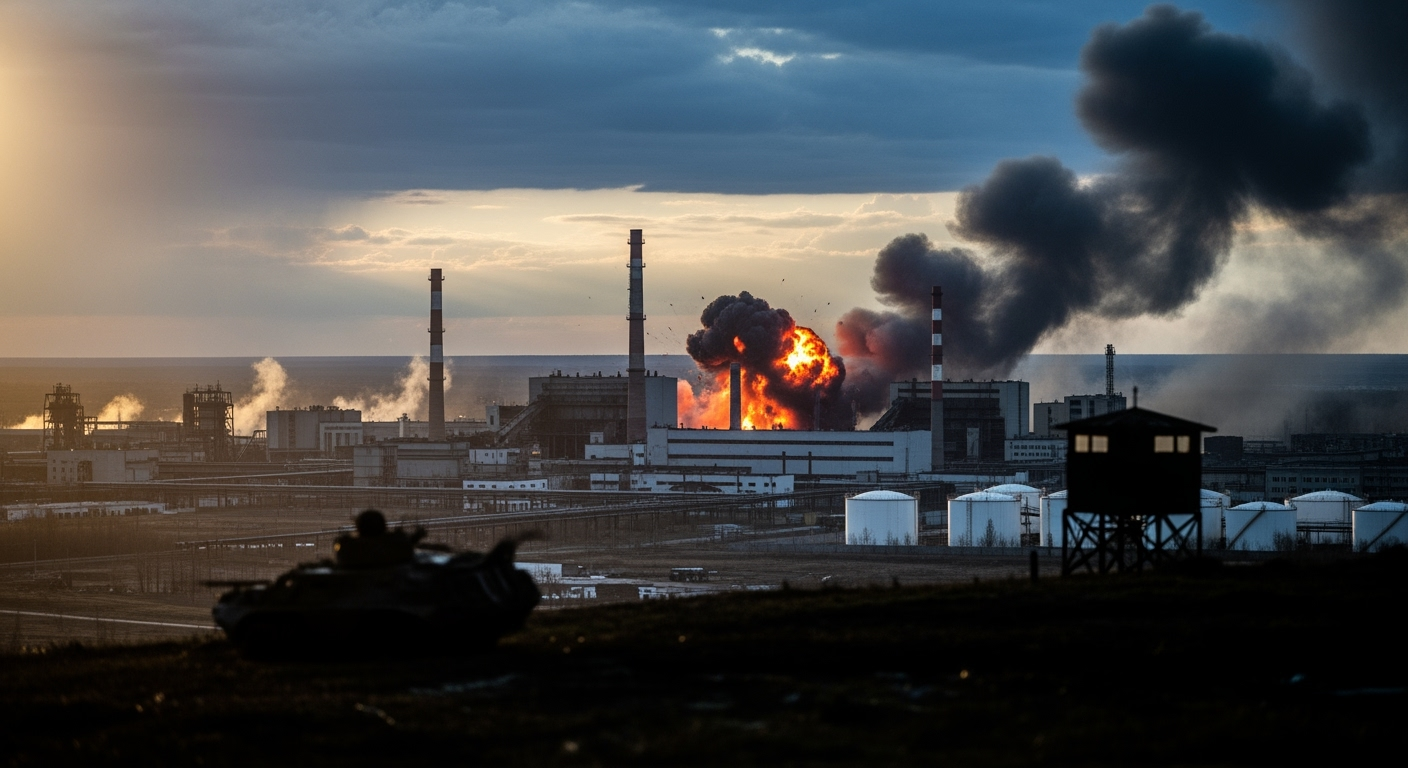Related Articles

Germany Steps In to Safeguard Salaries for Thousands of U.S. Base Workers Amid Prolonged U.S. Government Shutdown

EU Unveils 19th Sanctions Package, Intensifying Economic Pressure on Russia





Kyiv has intensified its strategic campaign against Russia's military-industrial complex, claiming a successful missile strike on a critical chemical plant in Russia's Bryansk Oblast on October 21, 2025. Ukrainian military officials reported that long-range Storm Shadow missiles penetrated Russian air defenses to hit the Bryansk Chemical Plant, a facility deemed essential for manufacturing gunpowder, explosives, and rocket fuel components vital to Moscow's ongoing war effort in Ukraine. This latest deep strike underscores Ukraine's persistent strategy to disrupt the logistical and production capabilities underpinning the Russian invasion, even as both sides escalate attacks on each other's critical infrastructure.
The Ukrainian General Staff confirmed that a "massive combined missile and air strike" was executed on October 21, specifically targeting the Bryansk Chemical Plant. The operation involved air-launched Storm Shadow missiles, which Ukrainian forces asserted successfully bypassed Russian air defense systems. The extent of the damage inflicted by the strike is still under assessment, according to Kyiv's military reports. The Bryansk Chemical Plant, located in Russia's Bryansk Oblast, has been identified by Ukrainian intelligence as a cornerstone of the aggressor state's defense industry.
Regional Governor Aleksandr Bogomaz of Bryansk acknowledged Ukrainian attacks in the region on Tuesday, mentioning drone and missile activity, but maintained that there were no reported injuries or significant damage. Concurrently, Russia's Ministry of Defense claimed to have intercepted some 57 drones over the Bryansk region on the same day. These conflicting accounts are characteristic of the information warfare accompanying the conflict, making independent verification challenging in the immediate aftermath of such events.
The Bryansk Chemical Plant's significance to Russia's military capability cannot be overstated. It is a primary producer of gunpowder, various explosives, and critical rocket fuel components that are directly utilized in the ammunition and missiles Russia employs against Ukraine. Its designation as a "key facility" within the Russian military-industrial complex highlights its strategic value as a target.
The plant's role in sustaining the Russian war machine has previously drawn international attention, leading to sanctions imposed by both the United States and the United Kingdom. Moreover, this is not the first time the facility has come under fire; previous reports indicate it was targeted in earlier strikes, with some involving long-range ATACMS missiles. The repeated targeting of such an enterprise underscores Ukraine's strategic focus on debilitating Russia's ability to produce and resupply its forces with essential military materiel.
The strike on the Bryansk Chemical Plant occurred amidst a period of heightened cross-border activity and diplomatic maneuvering. On the same day of the attack, Ukrainian President Volodymyr Zelenskyy was engaged in talks in Sweden concerning a defense export contract. This timing potentially links the offensive to broader Ukrainian efforts to secure international support and demonstrate its capacity for offensive actions deep within Russian territory.
Meanwhile, Russia has also escalated its own attacks, particularly targeting Ukraine's energy infrastructure. Reports from October 21 and 22, 2025, detail significant Russian missile and drone attacks across Ukraine, including the capital Kyiv, which resulted in casualties and widespread power outages. Ukrainian officials described these Russian tactics as an attempt to terrorize the population and deliberately prolong humanitarian crises by hitting damaged facilities. This tit-for-tat escalation indicates a broadening of the conflict's geographical scope and a clear focus on each belligerent's strategic resources.
The attack on the Bryansk Chemical Plant is a prominent example of Ukraine's evolving strategy to conduct deep strikes against Russia's military-industrial base. Kyiv has consistently aimed to degrade Moscow's war-fighting capabilities by striking targets far behind the front lines. This includes facilities producing critical components for weaponry, as well as logistical hubs and energy infrastructure that fuel the Russian military.
Earlier in 2025 and late 2024, similar tactics were employed against another vital Russian facility: the Tambov Gunpowder Plant, located in the Tambov region. This plant, responsible for manufacturing gunpowder for firearms, artillery, and rocket systems, has been repeatedly targeted by Ukrainian drones, notably on January 16, June 11, and July 25, 2025, and previously on July 4, 2024. These prior attacks, some of which reportedly caused temporary cessation of operations and damage, illustrate Ukraine's sustained commitment to undermining Russia's domestic arms production. Such persistent strikes aim to create significant delays and shortages in Russia's supply chains, ultimately impacting its ability to sustain high-intensity combat operations.
The successful targeting of the Bryansk Chemical Plant with Storm Shadow missiles represents a significant development in Ukraine's ongoing deep strike campaign. By aiming at facilities crucial for the production of military explosives and components, Kyiv seeks to directly impact Russia's capacity to wage war. While the immediate effects of the latest Bryansk strike are still being evaluated, the consistent pressure on Russia's military-industrial complex, as evidenced by this and previous attacks on targets like the Tambov Gunpowder Plant, suggests a strategic imperative to degrade Moscow's long-term combat potential. These strikes, often met with Russian counter-attacks on Ukrainian civilian and energy infrastructure, underscore the escalating and increasingly complex nature of the conflict, where the battlefront extends far beyond traditional lines to encompass the very foundations of each nation's war-making capabilities.